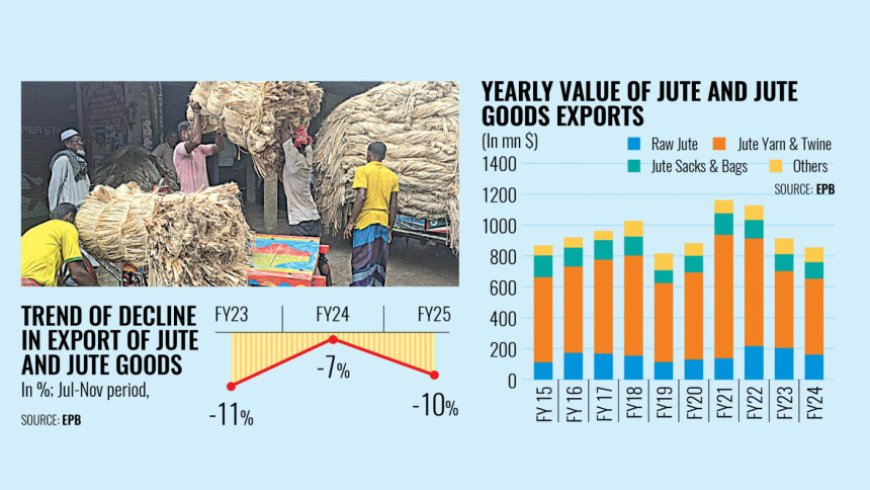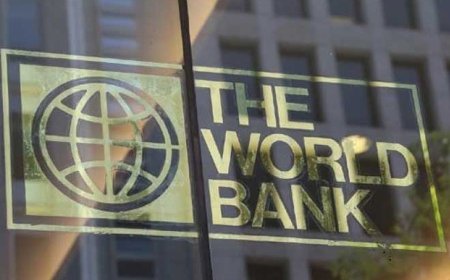Jute millers facing challenges due to export decline
Jute millers are facing difficulties as exports show little sign of recovery and domestic demand remains sluggish, compounded by the slow enforcement of the mandatory jute packaging act.

Industry operators report that declining demand for jute, once known as Bangladesh’s golden fibre, has forced jute yarn manufacturers to cut production by up to 40%. Currently, only around two dozen out of 77 spinners in the Bangladesh Jute Spinners Association (BJSA) are operating at full capacity. "The sector is in critical condition. We're struggling immensely. Only a few mills remain solvent," said Tapash Pramanik, Chairman of BJSA.
Jute yarn, the sector’s primary export, has seen a steady decline in shipments since its peak of nearly $800 million in the 2020-21 fiscal year. Foreign buyers have increasingly turned to cotton yarn and polypropylene (PP) due to rising jute yarn prices, driven by the increased cost of raw jute.
According to the Export Promotion Bureau (EPB), earnings from jute-based yarn dropped to $492 million by the end of FY24. Exports of jute sacks and bags also fell, with total receipts for jute and jute products falling 6% year-on-year to $855 million in FY24. In the July-November period of FY25, exports of jute and related products saw a 10% decrease, totaling $341 million.
Pramanik noted that the situation for composite mills is also grim. "We are losing competitiveness globally. Exports to India have dwindled since India imposed an anti-dumping duty," he said.
The sector has not received the same level of policy support it once did, while production costs have risen due to higher raw jute prices. "Had the mandatory jute packaging law been effectively enforced locally, we could have weathered this storm," he added.
The government passed a law in 2010 requiring jute sacks for packaging essential products like rice, wheat, maize, pulses, and flour, to stabilize the sector amid fluctuating international demand and promote biodegradable bags. However, it took five years for rice millers to comply, and many have since switched to plastic bags. "We are now competing with plastics in the domestic market," Pramanik said.
An industry insider explained that most mills have drastically reduced production to maintain minimal operations due to bank loans. "We have fixed costs, despite the decline in exports. Our income is barely enough to cover interest payments on bank loans," said Abdul Barik Khan, secretary-general of the Bangladesh Jute Mills Association.
Additionally, jute hoarders have been driving up raw jute prices, further complicating the situation. While poor jute yields were previously blamed for rising prices, Bangladesh's jute production dropped 18% year-on-year to 75.65 lakh bales (around 182 kilograms per bale) in FY25, according to the Department of Agricultural Extension (DAE). Jute millers and spinners process nearly 80% of the country's jute for producing sacks, bags, yarn, and twine for export.
Helal Ahmed, COO of leading jute exporter Janata-Sadat Jute Mills, said that raw jute for yarn production is currently selling for around Tk 4,000 per maund. However, export prices are declining, and demand for jute yarn from countries like Turkey and Uzbekistan has decreased as carpet manufacturers there seek alternatives to jute.
"The overall jute industry is not in good shape," Ahmed stated. While demand for jute bags has recently risen in the domestic market due to the government's push to limit plastic bag use, he urged the government to implement a comprehensive plan to reduce plastic bag usage, enabling local mills to meet the demand. "Many factories that once operated three shifts now run just one. We hope for a positive outlook after the next harvest in August, as production is expected to increase," he added.
What's Your Reaction?





















































































